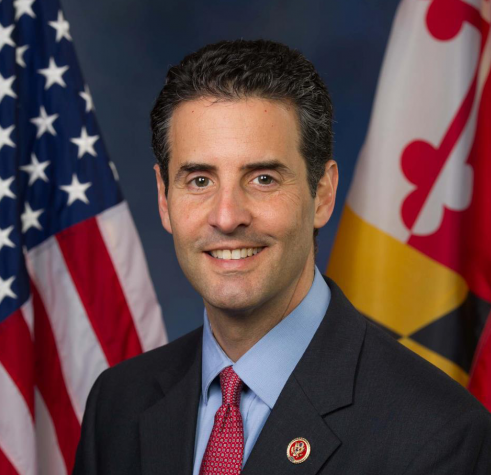WASHINGTON, D.C. – Congressman John Sarbanes (D-Md.) and Senator Tammy Duckworth (D-Ill.) introduced legislation to help break down the significant barriers that Americans with disabilities continue to face when accessing website and software applications, which all Americans rely on for employment, commerce, education, public services and all other aspects of society.
The Websites and Software Applications Accessibility Act would build on the promise of the Americans with Disabilities Act (ADA)—passed over 32 years ago—by requiring that entities currently covered by the ADA, as well as commercial providers, maintain websites and software applications that are accessible for Americans with disabilities. This legislation would also establish a clear accessibility standard as well as establish a technical assistance center and advisory committee to provide advice and guidance on how to develop and maintain accessible websites and applications. Additionally, this legislation would authorize a study on the effects that emerging technologies have on the ability of individuals with disabilities to participate in society.
“Throughout the COVID-19 pandemic, and well before, so many Americans relied on the internet to work from home, order home goods and connect with loved ones—and yet, too many websites and apps remain nearly impossible to use by Americans with disabilities, barring them from these experiences and opportunities,” said Senator Duckworth. “I’m proud to introduce this legislation with Congressman Sarbanes to finally help make the web and other technology more accessible for all users, including those in the disability community.”
“Digital innovation is only as powerful as it is inclusive. As new and emerging technologies have been incorporated into our daily lives, digital inaccessibility has prevented Americans with disabilities from reaching a broad range of health, education, employment and other critical resources. To address this civil rights issue and remedy this longstanding inequity, we need uniform, consistent standards that lay out what true digital accessibility is and provide adequate mechanisms to enforce it,” said Congressman Sarbanes. “The Websites and Software Applications Accessibility Act will require federal agencies to provide clear regulations for reducing barriers to web accessibility and help businesses and state and local governments work toward compliance. Senator Duckworth and I are pleased to introduce this legislation with the input of disability advocates to take an important step to achieving equity and inclusion for all Americans.”
“Although we have had some success in vindicating the right of blind Americans to live and work in our increasingly digital world, individual complaints and agreements simply cannot keep pace with the expansion and evolution of technology, and entities who want to effectively serve customers with disabilities are asking for guidance,” said Mark Riccobono, President of the National Federation of the Blind. “We commend Senator Duckworth and Representative Sarbanes for introducing this legislation, and we urge their colleagues to act swiftly on this common-sense proposal that will finally close the gap caused by inaccessible technologies and clarify and enforce what our nation’s disability laws and policies require.”
“This bill is as significant as the introduction of the ADA and shows the cooperation and support from the disability community,” said Tony Coelho, former Democratic Congressman from California and author of the ADA. “As President Bush said on the signing of the ADA—‘the walls of exclusion need to be taken down’—this is another step in that direction.”
“This bill builds on the strength and success of the ADA and significantly advances access to the digital world by covering, for the first time, the commercial providers who actually design websites and mobile apps,” said John L. Wodatch, disability rights attorney and principle architect of the ADA’s regulations.
While the U.S. Department of Justice (DOJ) has long held that the ADA covers websites and other technologies that are critical to accessing a business or agency and its services, the DOJ has not yet issued accessibility regulations covering websites and applications to accommodate Americans with disabilities. Additionally, despite existing DOJ guidance stating that websites should be in compliance with the ADA, it does not yet address applications and software in “smart” devices, such as cars, refrigerators, tractors, phones, thermostats and so on.
Furthermore, courts have not consistently interpreted whether and how the ADA covers websites. While this legislation does not amend the ADA, it affirms that the ADA requires websites and applications used by certain businesses be accessible and useable by Americans with disabilities and that this requirement applies regardless of whether the business has a physical location or merely exists online.
The Websites and Software Applications Accessibility Act also directs the DOJ and Equal Employment Opportunity Commission (EEOC) to issue regulations that help ensure Americans with disabilities have equal access to websites and applications as nondisabled people.
Along with Sarbanes and Duckworth, this legislation is co-sponsored by: U.S. Senators Bob Casey (D-Pa.), Brian Schatz (D-Hawaii) and Ed Markey (D-Mass.).
In addition to the National Federation of the Blind, Tony Coelho and John Wodatch, this legislation is supported by: Access Living, American Association of People with Disabilities, American Council of the Blind, American Foundation for the Blind, Association of Programs for Rural Independent Living, Bazelon Center for Mental Health Law, Blinded Veterans Association, CommunicationFIRST, Disability Rights Education and Defense Fund, Epilepsy Foundation of America, Hearing Loss Association of America, National Association of the Deaf, National Council on Independent Living, National Disability Institute, National Disability Rights Network, Paralyzed Veterans of America, Telecommunications for the Deaf and Hard of Hearing, Inc., The Arc, United Spinal Association and Vietnam Veterans of America.
See here for a copy of the bill text.
See here for a one-pager of the bill.
See here for a section-by-section of the bill.
See here for Frequently Asked Questions on the bill.







